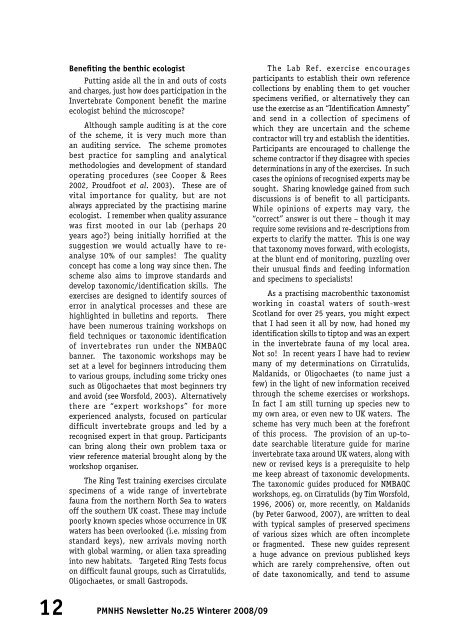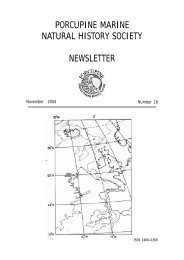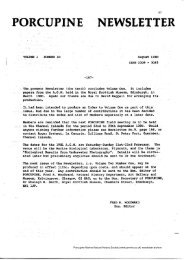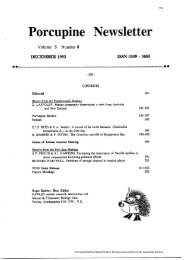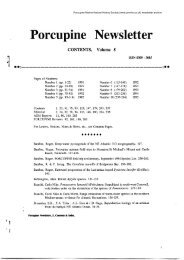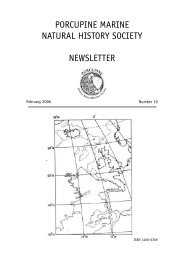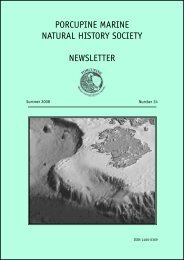Porcupine Newsletter Number 25, Winter 2008/09.
Porcupine Newsletter Number 25, Winter 2008/09.
Porcupine Newsletter Number 25, Winter 2008/09.
Create successful ePaper yourself
Turn your PDF publications into a flip-book with our unique Google optimized e-Paper software.
12Benefiting the benthic ecologistPutting aside all the in and outs of costsand charges, just how does participation in theInvertebrate Component benefit the marineecologist behind the microscope?Although sample auditing is at the coreof the scheme, it is very much more thanan auditing service. The scheme promotesbest practice for sampling and analyticalmethodologies and development of standardoperating procedures (see Cooper & Rees2002, Proudfoot et al. 2003). These are ofvital importance for quality, but are notalways appreciated by the practising marineecologist. I remember when quality assurancewas first mooted in our lab (perhaps 20years ago?) being initially horrified at thesuggestion we would actually have to reanalyse10% of our samples! The qualityconcept has come a long way since then. Thescheme also aims to improve standards anddevelop taxonomic/identification skills. Theexercises are designed to identify sources oferror in analytical processes and these arehighlighted in bulletins and reports. Therehave been numerous training workshops onfield techniques or taxonomic identificationof invertebrates run under the NMBAQCbanner. The taxonomic workshops may beset at a level for beginners introducing themto various groups, including some tricky onessuch as Oligochaetes that most beginners tryand avoid (see Worsfold, 2003). Alternativelythere are “expert workshops” for moreexperienced analysts, focused on particulardifficult invertebrate groups and led by arecognised expert in that group. Participantscan bring along their own problem taxa orview reference material brought along by theworkshop organiser.The Ring Test training exercises circulatespecimens of a wide range of invertebratefauna from the northern North Sea to watersoff the southern UK coast. These may includepoorly known species whose occurrence in UKwaters has been overlooked (i.e. missing fromstandard keys), new arrivals moving northwith global warming, or alien taxa spreadinginto new habitats. Targeted Ring Tests focuson difficult faunal groups, such as Cirratulids,Oligochaetes, or small Gastropods.PMNHS <strong>Newsletter</strong> No.<strong>25</strong> <strong>Winter</strong>er <strong>2008</strong>/09The Lab Ref. exercise encouragesparticipants to establish their own referencecollections by enabling them to get voucherspecimens verified, or alternatively they canuse the exercise as an “Identification Amnesty”and send in a collection of specimens ofwhich they are uncertain and the schemecontractor will try and establish the identities.Participants are encouraged to challenge thescheme contractor if they disagree with speciesdeterminations in any of the exercises. In suchcases the opinions of recognised experts may besought. Sharing knowledge gained from suchdiscussions is of benefit to all participants.While opinions of experts may vary, the“correct” answer is out there – though it mayrequire some revisions and re-descriptions fromexperts to clarify the matter. This is one waythat taxonomy moves forward, with ecologists,at the blunt end of monitoring, puzzling overtheir unusual finds and feeding informationand specimens to specialists!As a practising macrobenthic taxonomistworking in coastal waters of south-westScotland for over <strong>25</strong> years, you might expectthat I had seen it all by now, had honed myidentification skills to tiptop and was an expertin the invertebrate fauna of my local area.Not so! In recent years I have had to reviewmany of my determinations on Cirratulids,Maldanids, or Oligochaetes (to name just afew) in the light of new information receivedthrough the scheme exercises or workshops.In fact I am still turning up species new tomy own area, or even new to UK waters. Thescheme has very much been at the forefrontof this process. The provision of an up-todatesearchable literature guide for marineinvertebrate taxa around UK waters, along withnew or revised keys is a prerequisite to helpme keep abreast of taxonomic developments.The taxonomic guides produced for NMBAQCworkshops, eg. on Cirratulids (by Tim Worsfold,1996, 2006) or, more recently, on Maldanids(by Peter Garwood, 2007), are written to dealwith typical samples of preserved specimensof various sizes which are often incompleteor fragmented. These new guides representa huge advance on previous published keyswhich are rarely comprehensive, often outof date taxonomically, and tend to assume


